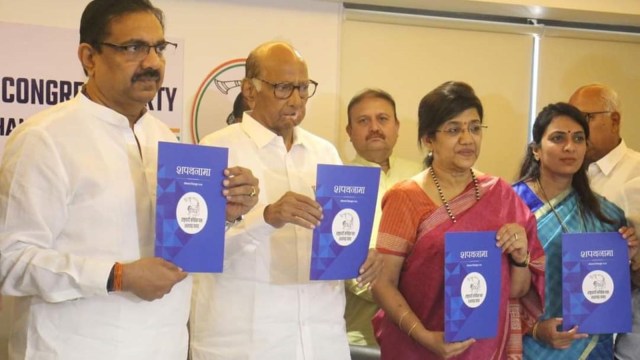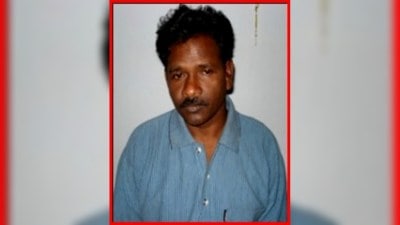UNVEILING its “Shapatnama” instead of manifesto, the NCP (Sharadchandra Pawar) on Thursday accused Prime Minister Narendra Modi of leading the country by his “whims and fancies, putting minorities under constant threat and using government machinery as a weapon to break democratic systems and suppress political opposition”. The manifesto lays emphasis on caste-based census, uplifting the lives of farmers and raising the reservation ceiling above 50 per cent.
“Over the last decade, we have witnessed the centralisation of power and the country is being led by the whims and fancies of the Prime Minister. Minorities in the country are under constant threat and government machinery is being used as a weapon, with persistent efforts to break democratic systems and suppress political opposition,” the manifesto stated, right at the beginning.

The manifesto was unveiled by NCP (SP) chief Sharad Pawar in Pune city. Party’s state president Jayant Patil and former Rajya Sabha MP Vandana Chavan, among others, were present at the function.
Story continues below this ad
“Suppression of dissenting voices, restriction on speech and expression and the use of executive authority to bypass democratic processes has now become the norm,” it said.
Criticising attempts to “muzzle voices of opposition leaders, sideline Parliament and crush farmers’ protest, the manifesto said, “The current trend of the government is to rule by sidelining Parliament, not allowing the elected representatives to voice the real concerns of the people. Issues like price rise, unemployment, corruption, farmers’ distress, economy etc do not find a place for discussion in Parliament — the highest temple of democracy. Farmers are the backbone of the country and their movements are being crushed. Policies are being implemented not for the people but for industrialists.”
Rejecting Modi’s idea of ‘one nation, one election’, the NCP (SP) said it supports the demand for full statehood for Jammu and Kashmir and rejects the idea of ‘one nation, one election’. The party said it will review and propose changes to the Citizenship (Amendment) Act (CAA), National Register for Citizens (NRC), Unlawful Activities (Prevention) Act (UAPA) and other laws “conflicting” with Constitutional principles.
The NCP (SP) said a manifesto represents not just a political statement, but a pledge to restore the spirit of consensus and inclusive decision-making as envisioned by Dr Babasaheb Ambedkar, the architect of the Indian Constitution.
Story continues below this ad
Lamenting that polarisation and fanaticism are being sowed among the youth, the manifesto said, “Development is being pushed at the cost of the environment. We are losing the trust of neighboring countries. The list is endless. Throughout its history, Maharashtra has consistently risen in times of challenge, steering the nation through critical struggles and shaping its intellectual path. Now more than ever, there is a need to continue this tradition.”
The NCP (SP) alleged the BJP strategy seemed to be to undermine the identity of Maharashtra, cripple its influential leaders, weaken its economy and politically marginalise every party in the state. “The instability in Maharashtra due to BJP’s gameplan is unprecedented, which is causing regression in all fields. In the interest of every citizen of India, the NCP-SP wants to change this narrative. We are committed to the democratic values, inclusive development and pluralism. Respecting the emotions of the people, we present this manifesto.”
Calling for caste-based census, the NCP (SP) said, “We believe in the pursuit of equality. Our manifesto reflects our dedication to upliftment through affirmative action, ensuring that all communities have the opportunity to prosper. We demand a nationwide socio-economic and caste census to inform and fortify our commitment to affirmative action.”
The party said, “We seek to introduce a Constitutional amendment to exceed the 50 per cent quota in reservations for SC, ST and OBC communities and seek policy interventions based on the percentage of the categories. We insist on filling all reserved vacancies for SC, ST and OBC within one year.”
Story continues below this ad
“We will advocate for a law mandating specific resource allocation for SCs and STs in the annual budget and ensure the rigorous execution of the Forest Right Act, 2006. Our agenda includes providing institutional credit for SC and ST communities, doubling scholarship funds for higher education, establishing residential schools and district-level study centres, promoting inclusivity at workplaces and educational institutes, eliminating manual scavenging with technology and creating a dedicated helpline for enforcing the SC/ST (Prevention of Atrocities) Act, 1989,” it said.
The NCP (SP) supported Congress’ demand for legal guarantee to Minimum Support Price. “As recommended by the Swaminathan Commission, a legal guarantee will be given to MSPs. MSPs payable to the farmer-seller at procurement centres and APMCs will be directly credited digitally to the farmer’s bank account,” it said.









